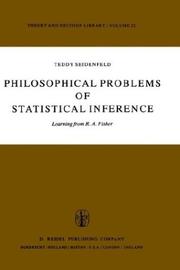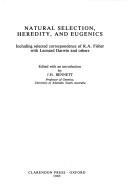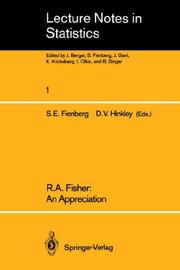| Listing 1 - 9 of 9 |
Sort by
|
Book
ISBN: 9781441994998 Year: 2011 Publisher: Berlin ; Heidelberg ; New York : Springer,
Abstract | Keywords | Export | Availability | Bookmark
 Loading...
Loading...Choose an application
- Reference Manager
- EndNote
- RefWorks (Direct export to RefWorks)
Classical statistical theory—hypothesis testing, estimation, and the design of experiments and sample surveys—is mainly the creation of two men: Ronald A. Fisher (1890-1962) and Jerzy Neyman (1894-1981). Their contributions sometimes complemented each other, sometimes occurred in parallel, and, particularly at later stages, often were in strong opposition. The two men would not be pleased to see their names linked in this way, since throughout most of their working lives they detested each other. Nevertheless, they worked on the same problems, and through their combined efforts created a new discipline. This new book by E.L. Lehmann, himself a student of Neyman's, explores the relationship between Neyman and Fisher, as well as their interactions with other influential statisticians, and the statistical history they helped create together. Lehmann uses direct correspondence and original papers to recreate an historical account of the creation of the Neyman-Pearson Theory as well as Fisher's dissent, and other important statistical theories.
Statistics --- History. --- Fisher, Ronald Aylmer, --- Neyman, Jerzy,
Book
ISBN: 9782823702996 Year: 2015 Publisher: Paris : RBA France,
Abstract | Keywords | Export | Availability | Bookmark
 Loading...
Loading...Choose an application
- Reference Manager
- EndNote
- RefWorks (Direct export to RefWorks)
La 4e de couverture indique : "Ronald A. Fisher dota les statistiques des outils conceptuels aussi bien que pratiques qui ont permis à ce champ de s'imposer partout aujourd'hui. Sa principale contribution, ce qu'on appelle l'inférence statistique, permet en effet de discuter des caractéristiques d'une population à partir de données expérimentales sur des échantillons. Ce mécanisme novateur repose sur le calcul mathématique des probabilités. La statistique, qui n'était jusque-là qu'un simple outil au service d'autres disciplines, connut ainsi un élan qui la propulsa au rang de science autonome. C'est aussi à ce mathématicien et biologiste britannique que l'on doit l'utilisation de la méthode statistique dans la planification d'expérimentations scientifiques. Ses recherches le conduisirent sur le terrain de la génétique et de la théorie moderne de l'évolution, et il put réconcilier la vision issue des lois de Mendel avec le darwinisme."
Statistique mathématique. --- Probabilités. --- Fisher, Ronald Aylmer

ISBN: 9027709653 9789027709653 Year: 1979 Volume: 22 Publisher: Dordrecht: Reidel,
Abstract | Keywords | Export | Availability | Bookmark
 Loading...
Loading...Choose an application
- Reference Manager
- EndNote
- RefWorks (Direct export to RefWorks)
Mathematical statistics --- Philosophy --- Fisher, Ronald Aylmer --- AA / International- internationaal --- 303.0 --- -Mathematics --- Statistical inference --- Statistics, Mathematical --- Statistics --- Probabilities --- Sampling (Statistics) --- Statistische technieken in econometrie. Wiskundige statistiek (algemene werken en handboeken). --- Statistical methods --- Fisher, Ronald Aylmer Sir --- -Statistische technieken in econometrie. Wiskundige statistiek (algemene werken en handboeken). --- Philosophy. --- Mathematics --- Statistische technieken in econometrie. Wiskundige statistiek (algemene werken en handboeken) --- Fisher, Ronald Aylmer, --- Fisher, R. A. --- Fisher, Ronald A. --- Mathematical statistics - Philosophy

ISBN: 0198581777 9780198581772 Year: 1983 Publisher: Oxford : Clarendon Press,
Abstract | Keywords | Export | Availability | Bookmark
 Loading...
Loading...Choose an application
- Reference Manager
- EndNote
- RefWorks (Direct export to RefWorks)
Biologists --- Eugenics. --- Genetics. --- Natural selection. --- Selection (Genetics). --- Correspondence --- Darwin, Leonard, --- Sélection naturelle --- Eugénisme --- Fisher, Ronald Aylmer, 1890-1962 --- Darwin, Leonard, 1850-1943

ISBN: 038790476X 354090476X 1461260795 9780387904764 Year: 1980 Volume: 1 Publisher: New York: Springer,
Abstract | Keywords | Export | Availability | Bookmark
 Loading...
Loading...Choose an application
- Reference Manager
- EndNote
- RefWorks (Direct export to RefWorks)
Mathematical statistics --- Statistique mathématique --- Fisher, Ronald Aylmer, --- Addresses, essays, lectures --- Fisher, Ronald Aylmer --- wiskunde --- kanstheorie --- statistiek --- combinatieleer --- 10.02.b --- Statistieken ; Wiskundige statistiek --- Mathematical statistics. --- Statistique mathématique --- Mathematics --- Statistical inference --- Statistics, Mathematical --- Statistics --- Probabilities --- Sampling (Statistics) --- Statistical methods --- Fisher, R. A. --- Fisher, Ronald A. --- Mathematical statistics - Addresses, essays, lectures --- Histoire des mathematiques --- Statistique mathematique --- Mathematiciens --- Biographies --- Histoire
Book
ISBN: 0471093009 Year: 1978 Publisher: New York Wiley
Abstract | Keywords | Export | Availability | Bookmark
 Loading...
Loading...Choose an application
- Reference Manager
- EndNote
- RefWorks (Direct export to RefWorks)
Statisticians --- 929 --- 929 Biography. Genealogy. Heraldry --- Biography. Genealogy. Heraldry --- 929 Biografie. Genealogie. Heraldiek --- Biografie. Genealogie. Heraldiek --- Mathematicians --- Biography --- Fisher, Ronald Aylmer, --- Fisher, R. A. --- Fisher, Ronald A. --- Mathematical statistics --- Fisher, R. --- 960 --- levensbeschrijvingen --- biographies et mémoires
Book
ISBN: 1441994998 1441995005 Year: 2011 Publisher: New York, NY : Springer Science+Business Media, LLC,
Abstract | Keywords | Export | Availability | Bookmark
 Loading...
Loading...Choose an application
- Reference Manager
- EndNote
- RefWorks (Direct export to RefWorks)
Classical statistical theory—hypothesis testing, estimation, and the design of experiments and sample surveys—is mainly the creation of two men: Ronald A. Fisher (1890-1962) and Jerzy Neyman (1894-1981). Their contributions sometimes complemented each other, sometimes occurred in parallel, and, particularly at later stages, often were in strong opposition. The two men would not be pleased to see their names linked in this way, since throughout most of their working lives they detested each other. Nevertheless, they worked on the same problems, and through their combined efforts created a new discipline. This new book by E.L. Lehmann, himself a student of Neyman’s, explores the relationship between Neyman and Fisher, as well as their interactions with other influential statisticians, and the statistical history they helped create together. Lehmann uses direct correspondence and original papers to recreate an historical account of the creation of the Neyman-Pearson Theory as well as Fisher’s dissent, and other important statistical theories.
Fisher, Ronald Aylmer, -- Sir, -- 1890-1962 -- Contributions in statistics. --- Neyman, Jerzy, -- 1894- -- Contributions in statistics. --- Statistics. --- Statistics --- Mathematics --- Physical Sciences & Mathematics --- Mathematical Statistics --- History --- Mathematical statistics. --- Statistical inference --- Statistics, Mathematical --- Statistical analysis --- Statistical data --- Statistical methods --- Statistical science --- Statistical Theory and Methods. --- Econometrics --- Probabilities --- Sampling (Statistics) --- Statistics . --- Fisher, Ronald Aylmer, --- Neyman, Jerzy, --- Neĭman, I︠U︡., --- Splawa, Jerzy Neyman-, --- Neyman, J. --- Neyman, Yuri Cheslavovich --- Fisher, R. A. --- Fisher, Ronald A.
Book
ISBN: 113734136X 1137341378 9781137341365 Year: 2016 Publisher: London : Palgrave Macmillan UK : Imprint: Palgrave Macmillan,
Abstract | Keywords | Export | Availability | Bookmark
 Loading...
Loading...Choose an application
- Reference Manager
- EndNote
- RefWorks (Direct export to RefWorks)
This is the seventh book in a series of discussions about the great minds in the history and theory of finance. While the series addresses the contributions of scholars in our understanding of financial decisions and markets, this seventh book describes how econometrics developed and how its underlying assumptions created the underpinning of much of modern financial theory. The author shows that the theorists of econometrics were a mix of mathematicians and cosmologists, entrepreneurs, economists and financial scholars. The author demonstrates that by laying down the foundation of empirical analysis, they also forever determined the way in which we think about financial returns and the vocabulary we employ to describe them. Through this volume, the reader can discover the life stories, inspirations, and theories of Carl Friedrich Gauss, Francis Galton, Karl Pearson, Ronald Aylmer Fisher, Harold Hotelling, Alfred Cowles III, Ragnar Frisch, and Trygve Haavelmo, specifically. We learn how each theorist made an intellectual leap simply by thinking about a conventional problem in an unconventional way.
Finance. --- Econometrics. --- Finance, general. --- Eugenics. --- Statistics. --- Gauss, Carl Friedrich, --- Statistical analysis --- Statistical data --- Statistical methods --- Statistical science --- Homiculture --- Race improvement --- 330.08 --- Economisten --- Economics, Mathematical --- Statistics --- Mathematics --- Econometrics --- Euthenics --- Heredity --- Involuntary sterilization --- Funding --- Funds --- Economics --- Currency question --- Gauss, Carl Friedrich --- Galton, Francis --- Pearson, Karl --- Fisher, Ronald Aylmer --- Hotelling, Harold --- Frisch, Ragnar --- Haavelmo, Trygve M. --- Cowles, Alfred

ISBN: 1107125561 0521037549 0511147724 0511304986 0511498489 1280421509 0511045352 0511177399 9786610421503 0511016611 9780511016615 9780511045356 9780511498480 9780521812511 0521812518 0521812518 9780521037549 Year: 2002 Publisher: Cambridge ; New York : Cambridge University Press,
Abstract | Keywords | Export | Availability | Bookmark
 Loading...
Loading...Choose an application
- Reference Manager
- EndNote
- RefWorks (Direct export to RefWorks)
The term probability can be used in two main senses. In the frequency interpretation it is a limiting ratio in a sequence of repeatable events. In the Bayesian view, probability is a mental construct representing uncertainty. This 2002 book is about these two types of probability and investigates how, despite being adopted by scientists and statisticians in the eighteenth and nineteenth centuries, Bayesianism was discredited as a theory of scientific inference during the 1920s and 1930s. Through the examination of a dispute between two British scientists, the author argues that a choice between the two interpretations is not forced by pure logic or the mathematics of the situation, but depends on the experiences and aims of the individuals involved. The book should be of interest to students and scientists interested in statistics and probability theories and to general readers with an interest in the history, sociology and philosophy of science.
Probabilities. --- Bayesian statistical decision theory. --- Bayes' solution --- Bayesian analysis --- Statistical decision --- Probability --- Statistical inference --- Combinations --- Mathematics --- Chance --- Least squares --- Mathematical statistics --- Risk --- Jeffreys, Harold, --- Fisher, Ronald Aylmer, --- Fisher, R. A. --- Fisher, Ronald A. --- Dzheffris, Garolʹd, --- Bayesian statistical decision theory --- Probabilities --- Arts and Humanities --- Philosophy
| Listing 1 - 9 of 9 |
Sort by
|

 Search
Search Feedback
Feedback About UniCat
About UniCat  Help
Help News
News